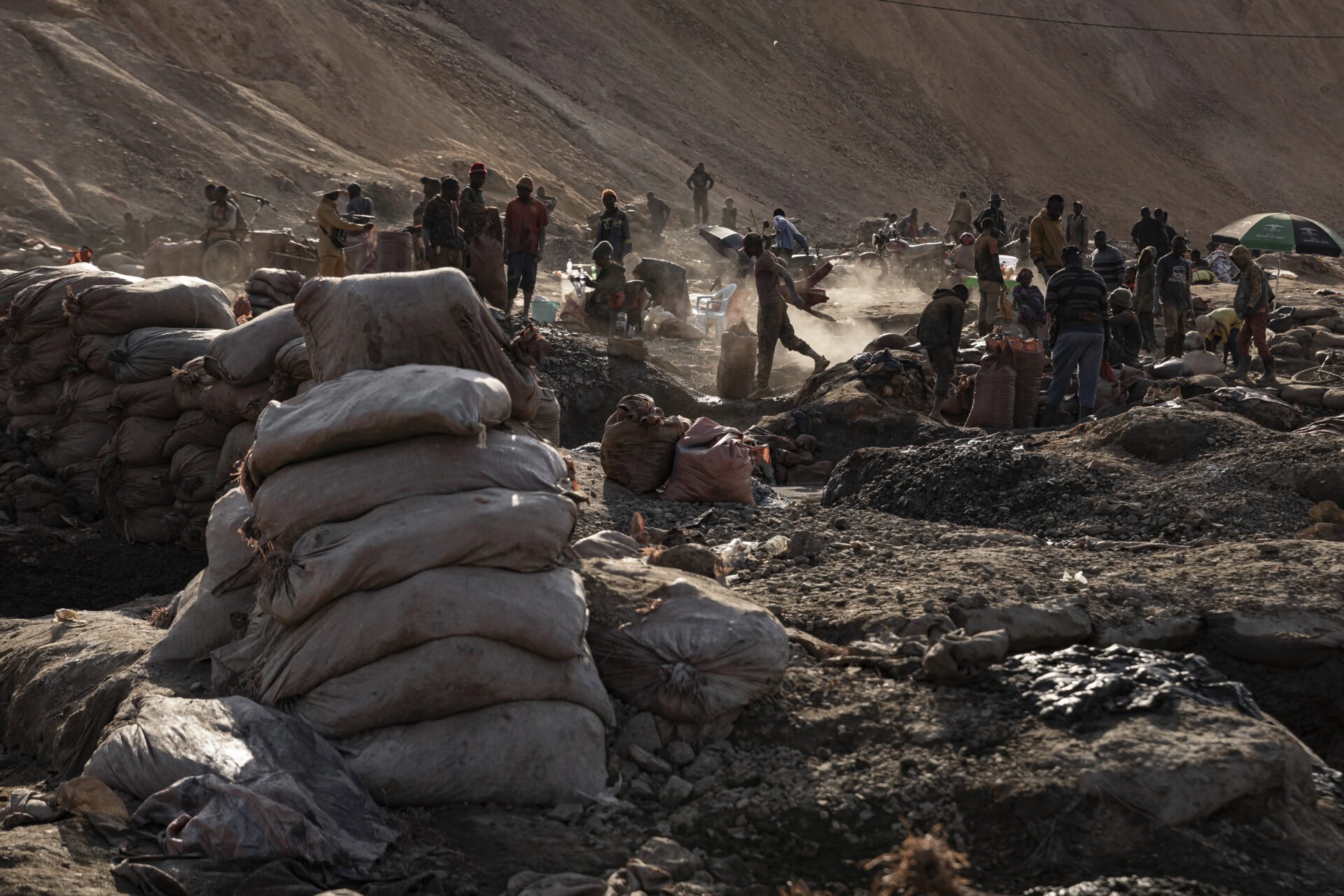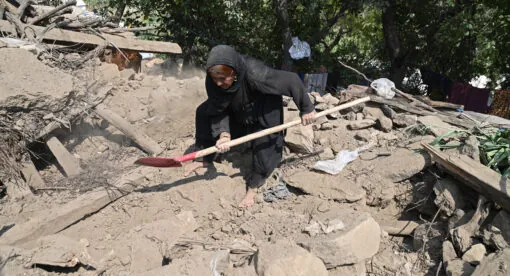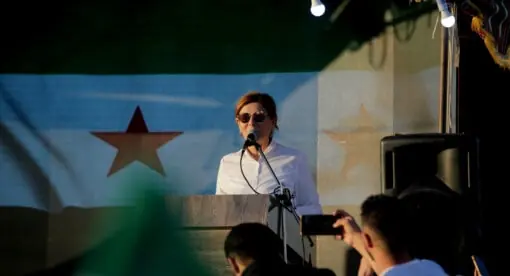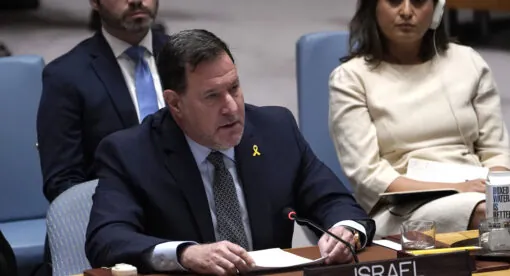After decades of bloodshed in the Democratic Republic of the Congo, President Félix Tshisekedi recently demanded the country’s parliament and the international community recognize the massacres in the provinces of North Kivu, South Kivu, and Ituri as genocide. At the 60th session of the United Nations Human Rights Council, which opened Sept. 8, in Geneva, Tshisekedi pressed the international community to confront the mass atrocities taking place in the DRC. Violence there today, as in years past, is driven by a struggle over the region’s mineral wealth coupled with postcolonial instability. Tshisekedi’s claims of genocide in the DRC define the competition over its resources as a motive for the increasing violence, a problem without a simple solution.
This escalation came when the Rwanda-backed paramilitary March 23 Movement (M23), also known as the Congolese Revolutionary Army, relaunched a rebellion after it regrouped from a 2013 defeat by the U.N. mission and the DRC government. In 2022, when the weak national government could not control the eastern provinces of the DRC, M23 reorganized to take advantage. M23, motivated chiefly by the abundance of resource deposits, including those of tin, tungsten, tantalum, gold, and coltan, has captured widespread territory since its renewed offensive began.
Now, M23 has relative autonomy over numerous mines and farmland, which allows it and other paramilitary groups to illicitly export mined products and gain control over villages. These groups, in opposition to government forces, pursue despotic rule to take control of resources and revenue. They engage in human rights abuses and war crimes and operate within a system of local warlord politics.
Millions of Congolese rely on artisanal mining to support their existence. Government initiatives promote these small, hazardous local operations by loosening regulations and laws to, ostensibly, help millions in poverty and famine conditions. Congolese local mining is erudite, relying on physical labor and basic tools, a contrast to the more sophisticated foreign-owned mining companies that also operate in the region. China, which has held a functional monopoly over DRC critical mineral mining and export infrastructure since the early 2000s, holds the advantage for pricing, access to mining fields, and economic autonomy over those resources. Meanwhile, local populations struggle to maintain access to a stable income and basic services. The international dynamics at play in the sector links how resource competition drives worsening mass atrocities in Ituri and the Kivu regions.
Mediation Efforts
In an effort to end the hostilities in Eastern Congo, the United States helped broker a peace deal that had been scheduled for signature before talks broke down, with both M23 and the DRC government claiming ceasefire violations. In July, Human Rights Watch found, M23 had executed more civilians than during any other month since its resurgence. In 2025, M23 advanced northward, which brought the group closer to the area controlled by the Allied Democratic Forces (ADF), an armed group vowing allegiance to the Islamic State. M23 and the ADF have not directly fought. However, attacks targeting civilians by both groups have increased both in number and brutality.
While the peace talks signaled commitment to regional stabilization, they excluded key Congolese factions from the formal negotiation process. Historically, peace processes in the DRC have excluded paramilitary groups without sufficient standing to negotiate as an equal to a government. While M23 was included in the most recent rounds of negotiations, other groups, particularly the ADF, the Mai Mai militias, and the Cooperative for the Development of the Congo (CODECO) , were not, contributing to the breakdown in talks and the subsequent increase in violence.
The most recent peace deal was negotiated alongside an economic framework that further expanded foreign access to mines in the DRC. Amid ongoing strategic competition between the U.S. and China, Kobold Metals — a newly formed U.S.-backed company — signed a preliminary agreement for mining exploration with the DRC on July 17, as the U.S.-mediated peace deal was being negotiated. The company has received seven mining permits, allowing it to acquire Manono, one of the largest lithium mines in the world, in the country’s southeast. Since then, Kobold has begun a large-scale mineral exploration there. This increased U.S. investment in the country’s resources could help counter China’s mining interests and secure a direct supply chain of critical minerals to the United States. However, the escalation in violence that undermined the peace deal could threaten to derail U.S. investment in Congolese mineral production while strengthening de facto militia control.
External Involvement
The DRC’s mineral wealth and weak mining regulations have drawn foreign companies to the country since Belgian colonial rule. Over the past 20 years, Chinese state-owned enterprises have established a functional monopoly over the country’s mining operations and the legal mineral market. This dominance, coupled with predatory contracts that lack payment transparency, have fueled corruption, led to community displacement, and helped enable illicit mining. For China, access to the DRC’s mineral wealth is key to its domination of the global electronics, critical minerals, electric vehicle batteries, and semiconductor sectors. China’s deep investment in the DRC’s mineral market is inseparable from its economic and strategic interests in Africa. China’s monopoly inhibited the DRC from developing its own markets and economic infrastructure, thus deepening its economic dependence.
Stabilization efforts by the U.N. have been largely ineffective after nearly 30 years of direct peacekeeping. The U.N. established its second Organization Stabilization Mission (MONUSCO) in the DRC during the emergence of M23 in July 2010. As U.N. peacekeeping in the DRC has been continuous since, it is clear that the mission has been ineffective in countering M23 violence. In light of criticism of MONUSCO’s effectiveness, especially in the face of M23’s territorial gains, the U.N. Security Council voted in 2023 to terminate the mission, with a one-year extension added in 2024. The completion of MONUSCO’s withdrawal was targeted for December 2025, but the process has been delayed as fighting among some 130 armed militia groups in Ituri and Kivu has increased.
The European Union has been a longtime supplier of humanitarian aid and developmental assistance to the country, specifically targeting food insecurity, health needs, and education access. Developing a vision for the future of the DRC, including the Lobito Corridor project, has increased trade and promoted sustainable agriculture, but there are few solutions to short-term issues. The EU is motivated in part by its shared interests with the U.S. and China in critical minerals supplies. the supply of critical minerals. Thus, the Critical Raw Materials Act allows the EU to pursue access to mineral supply chains without adequately addressing the human rights risks inherent to sourcing from conflict zones. The EU’s involvement in the conflict has only contributed to instability in the DRC. A lack of humanitarian aid delivery and failure to give consistent attention to Congolese suffering are factors.
Regional Involvement
Competition between Uganda and Rwanda has long exacerbated the conflict in the eastern DRC. Uganda has long cited its support of Congolese militias, including M23, as a necessary security buffer against rebel groups opposing Uganda from taking refuge in Ituri. While the Ugandan Christian rebel group, the Lord’s Resistance Army, has historically launched attacks into Uganda from the eastern regions of the DRC, it currently does not possess the strategic strength to do so. On the other hand, the IS-affiliated ADF has threatened Uganda’s economic interests in timber and gold, motivating its August deployment of troops into the DRC to combat the group directly. Ugandan soldiers have been cooperating with the Congolese armed forces (FARDC) to support their campaign of eradicating the ADF.
The United Nations has credibly accused both Rwanda and Uganda of providing longstanding political, logistical, and military support to M23 as a strategic proxy. Since Rwanda lacks natural mineral deposits, its motivations in the DRC are to protect the flow of illicitly mined minerals for exportation and settle the historical ethnic conflict between the Hutus and the Tutsis. In early September, alerts were raised regarding the deployment of Rwandan troops to South Kivu with ammunition and weapons. These troops are likely targeting the Democratic Forces for Liberation of Rwanda (FDLR), a Hutu militia known for participating the 1994 Rwandan genocide. Rwanda, with ground support from M23, has secured control over some mines in the DRC, limiting the effectiveness of the FARDC, and extending its sphere of influence. The partnership of Rwanda and M23 has contributed exponentially to the violent clashes and ethnic tensions in Ituri and Kivu.
The Islamic State network in Africa has taken advantage of the disorder in the east to expand through its support of the ADF. The jihadist group has been linked to brutal attacks in the DRC, specifically one that killed at least 50 worshippers in a church in late July, and the massacre in September of at least 70 people attending a funeral service. While instability in the DRC prevails, these attacks likely will increase in size and fatality as the Islamic State tends to flourish in chaotic environments.
Conflict Between State-Backed and Nonstate Militias
As the DRC government attempts to handle multiple crises with minimal resources, armed groups and militias have usurped local governance roles. The rise of paramilitary groups has alarmed stakeholders in the critical minerals market and transferred municipal governance roles to the conquering militia. Generally in the DRC, village identity and local chiefdoms have a much larger role in local politicking and more civilian involvement than the national government due to their proximity and their ability to provide more essential services. However, as militia groups have further destabilized the region, power conflicts between levels of governance have been exacerbated and resource governance has weakened. Conflicts between paramilitary groups often result in sexual violence, torture, kidnapping, agricultural raids, arson, and murder of civilians.
Nonstate militias operating inside local refugee camps have transformed the conflict into a proxy war between state-backed militias over mineral control, intensified the warlord politics of the region, and exacerbated the current humanitarian crisis. Echoing the horrors of the 1994 Rwandan genocide, longstanding ethnic tensions between the Hema and Lendu communities intensified in 2025. Attacks led by the Lendu-affiliated Nationalist and Integrationist Front (FNI) and CODECO broke a period of tenuous peace. Their grievances were fueled by colonial-era policies which historically favored the Hema and aggravated inequalities in access to land and resources. These militias have targeted both the FARDC and other armed militias.
Case Study: Conflict in the North and South Kivu Provinces
The Kivu conflict has been a violent struggle fueled by a toxic mix of mineral exploitation and ethnic tensions. The Kivu provinces, the heart of the country’s decades-long crisis, are home to a range of ethnic groups and armed militias, including M23, which currently controls strategic mining cities like Goma, Bukavu, and Walikale. Among the hundred or so other armed groups in the provinces, militias with connections to Rwanda and various splinter groups that make up the Mai Mai militias are also fighting for land with mining access.
M23 remains the most consistent and powerful actor in the Kivu. In recent years it has used Rwandan support to pursue its strategic objectives, including exerting control over land containing vital mines and supply networks to Rwanda. M23 also seeks to counter the FDLR, capture Congolese trade routes to Uganda and Rwanda, and protect Congolese Tutsis.
M23 attacks in Kivu have targeted civilians and displacement camps, resulting in mass killings, sexual violence, and the deliberate destruction of clinics, farmland, and schools. The DRC government outsources its security responsibilities in the Kivu to Wazalendo fighters, a coalition of armed militants that are key allies to the FARDC. This DRC government strategy complicates the region’s proxy warfare, contributing to the wide array of actors that often engage in abuses. Outsourcing to the Wazalendo connects the DRC armed forces to the human rights abuses against civilians in North and South Kivu.
The U.S. recently sanctioned the Coalition of Congolese Patriotic Resistance Force de Frappe (PARECO-FF) for its illegal taxation schemes, smuggling activities, and dangerous mining operations in the Kivu. Since North Kivu is home to the Rubaya coltan mines of the Masisi district, its centricity to mining operations and taxation schemes has been vital to illegal commerce in the DRC. One aspect of the failed U.S. peace framework that had been designed to reveal Chinese exploitation of the mining sector included sanctions designed to promote increased transparency and stricter mining regulations in the country. One Hong Kong-based mining company was also a target of these sanctions, illustrating the relationship between illicit mining operations and the foreign demand for critical minerals.
The ADF, which has loose ties with the Islamic State’s network in Africa, is also active in the Kivu provinces. MONUSCO attributed at least 50 civilian deaths to the group in August alone. Both M23 and the ADF have routinely engaged in looting, arson, and sexual violence in their pursuit of power and control. The resulting food shortages and humanitarian crisis establish the central role of mineral wealth in fueling the conflict and its persistence. Tshisekedi’s call for the conflict to be recognized as genocide, brings renewed urgency to end it. Despite this, intense violence among militia groups and the FARDC continues.
Case Study: Conflict in the Ituri Province
Ituri has historically been the primary battleground where regional ethnic rivalries and foreign-backed interventions have played out. Belgian colonial rule contributed to ethnically driven economic and political inequalities between the Hema and the Lendu in the DRC. Endemic violence between the groups has been ongoing since 1973. As a result, Ituri holds more than 1.6 million displaced people and makeshift camps are burdened by overcrowding and vulnerability to attacks.
Village rivalries have manifested into various militia groups since 1973. Key Hema actors in Ituri include the Union of Congolese Patriots, formally led by Thomas Lubanga, notably the first person to stand trial before the International Criminal Court. In April 2025, Lubanga, who was convicted of war crimes by the ICC, announced the formation of the Convention for Popular Revolution, a new rebel group in the province. It is unclear how many militants are loyal to Lubanga’s group; however, as the group has started to organize, it is possible that it could carry out offensives in Ituri in the near future.
The primary Lendu actors in the province have been the FNI, which has been accused of driving more than 70,000 Hema off farming lands. Other small-scale militias operating in Ituri include the Congolese Rally for Democracy, the Front for the Liberation of Congo, and the National Congress for the Defense of the People.
Some of these groups have since extended their operations into the Kivu provinces. Over the years each militia’s relative strength and prominence varies, as sporadic fighting is the norm. But fueling the ongoing violence and instability is the overarching economic agendas of both local and international actors. Support by Uganda and Rwanda for militia groups and the economic agendas of the U.S. and Qatar in driving diplomatic engagement with the DRC have provided the incentive for persistent instability in the DRC.
The Conflict Economy
The violence in Ituri and the Kivu provinces are interlocked, meaning that ending conflict in all three provinces is a necessary requirement for a sustainable peace in the DRC’s east. The case studies of Ituri and the Kivu present a connection between mineral wealth and the constant state of violence. Armed militias like M23 and numerous others have sought control over those mineral-rich territories to exploit the resources there. Competition over them has fueled mass atrocities, while the proliferation of small-scale artisanal and illicit mining has allowed those groups to profit through mineral production. The war economy, underpinned by international and technological demands, is both the driver and the result of the country’s ongoing suffering.
Policy Recommendations
Whether or not the international community recognizes Tshisekedi’s allegations of genocide, one focus should be on another short-term extension of MONUSCO’s mandate. The mission has begun preparations for its withdrawal when its current mandate ends in December. However, the recent uptick in violence justifies another extension, with a mandate to help establish a transitional justice infrastructure that works within the Congolese system. Despite its long history in the DRC without much notable success, renewing the U.N. mission is pivotal to civilian protection from increasing violence, combatting disease outbreaks, and supporting victims of sexual assaults, particularly in light of international aid cuts that have disrupted essential services. MONUSCO has previously supported provincial governance and has navigated its location inside conflicting zones among the FARDC, Wazalendo, M23, and ADF. As MONUSCO has paused its current withdrawal, another yearlong renewal would position it to facilitate cooperation between state forces and provincial institution-building.
A transitional justice architecture supported by MONUSCO would work toward the goal of the creation of a quasi-federal system to account for diversity and create a framework for sharing national power with the provinces. However, the DRC government, which cannot exercise effective state control over the east, has focused its negotiation strategy on reestablishing that power directly. Future negotiations that lead to provincial cooperation with the national government would establish its regulatory control over the eastern provinces and subsequently include the most influential nonstate actors in dialogue. Peace initiatives that focus on inclusivity will have the greatest probability of success. However, they would also rely on the willingness of the national government to cede power to provincial authorities.
To target the resource competition driving the multiple conflicts in the east, the DRC’s government must implement rigorous oversight over mining contracts, particularly the opaque deals and trade partnerships with Chinese firms. International certification of mineral flows and monitoring systems for transparency would help to curb illicit mineral flows from the DRC via Rwanda and remove the economic incentive for dangerous artisanal mining practices. Since the peace deal mediated by Qatar and the U.S. was not signed, it is important that the mechanisms for post-agreement engagement are enacted to maintain security guarantees and initiate economic incentives to persuade some militia groups to disarm. This would include sanctions, similar to the recent U.S. Treasury sanctions on entities linked in the support of illegal mining operations.
The views expressed in this article are those of the author and not an official policy or position of New Lines Institute.






